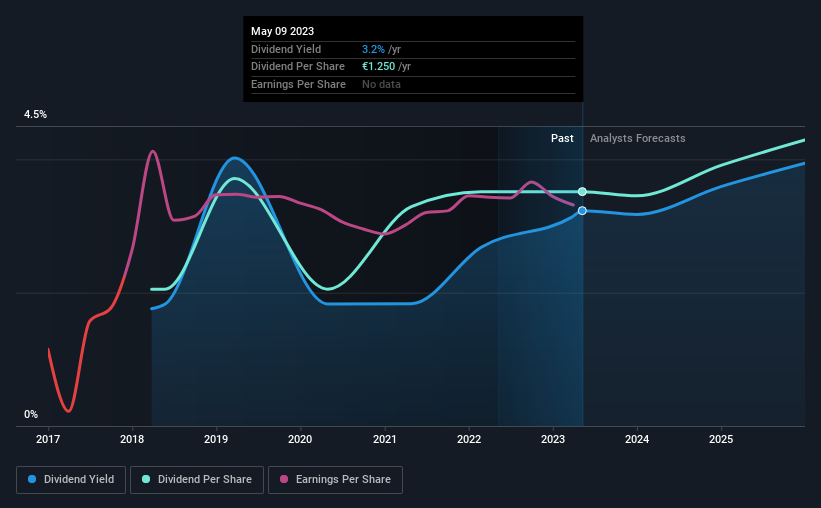
The board of Befesa S.A. (ETR:BFSA) has announced that it will pay a dividend of €1.25 per share on the 20th of June. Including this payment, the dividend yield on the stock will be 3.2%, which is a modest boost for shareholders' returns.
See our latest analysis for Befesa
Befesa's Earnings Easily Cover The Distributions
If it is predictable over a long period, even low dividend yields can be attractive. Based on the last dividend, Befesa is earning enough to cover the payment, but then it makes up 417% of cash flows. While the company may be more focused on returning cash to shareholders than growing the business at this time, we think that a cash payout ratio this high might expose the dividend to being cut if the business ran into some challenges.
Looking forward, earnings per share is forecast to rise by 42.0% over the next year. If the dividend continues along recent trends, we estimate the payout ratio will be 40%, which is in the range that makes us comfortable with the sustainability of the dividend.

Befesa's Dividend Has Lacked Consistency
Looking back, Befesa's dividend hasn't been particularly consistent. Due to this, we are a little bit cautious about the dividend consistency over a full economic cycle. Since 2018, the annual payment back then was €0.73, compared to the most recent full-year payment of €1.25. This implies that the company grew its distributions at a yearly rate of about 11% over that duration. Despite the rapid growth in the dividend over the past number of years, we have seen the payments go down the past as well, so that makes us cautious.
The Dividend Has Limited Growth Potential
Given that the dividend has been cut in the past, we need to check if earnings are growing and if that might lead to stronger dividends in the future. Befesa's earnings per share has shrunk at 11% a year over the past five years. A sharp decline in earnings per share is not great from from a dividend perspective. Even conservative payout ratios can come under pressure if earnings fall far enough. On the bright side, earnings are predicted to gain some ground over the next year, but until this turns into a pattern we wouldn't be feeling too comfortable.
Befesa's Dividend Doesn't Look Sustainable
Overall, we don't think this company makes a great dividend stock, even though the dividend wasn't cut this year. While Befesa is earning enough to cover the payments, the cash flows are lacking. We don't think Befesa is a great stock to add to your portfolio if income is your focus.
Market movements attest to how highly valued a consistent dividend policy is compared to one which is more unpredictable. Still, investors need to consider a host of other factors, apart from dividend payments, when analysing a company. To that end, Befesa has 4 warning signs (and 1 which is a bit unpleasant) we think you should know about. Looking for more high-yielding dividend ideas? Try our collection of strong dividend payers.
Valuation is complex, but we're here to simplify it.
Discover if Befesa might be undervalued or overvalued with our detailed analysis, featuring fair value estimates, potential risks, dividends, insider trades, and its financial condition.
Access Free AnalysisHave feedback on this article? Concerned about the content? Get in touch with us directly. Alternatively, email editorial-team (at) simplywallst.com.
This article by Simply Wall St is general in nature. We provide commentary based on historical data and analyst forecasts only using an unbiased methodology and our articles are not intended to be financial advice. It does not constitute a recommendation to buy or sell any stock, and does not take account of your objectives, or your financial situation. We aim to bring you long-term focused analysis driven by fundamental data. Note that our analysis may not factor in the latest price-sensitive company announcements or qualitative material. Simply Wall St has no position in any stocks mentioned.
About XTRA:BFSA
Befesa
Offers environmental recycling services to the steel and aluminum industries in European, Asian, and North American markets.
Proven track record with adequate balance sheet.
Similar Companies
Market Insights
Community Narratives



